| Listing 1 - 10 of 10 |
Sort by
|
Book
ISBN: 0719035511 Year: 1992 Publisher: Manchester [England] New York New York Manchester University Press Distributed exclusively in the USA and Canada by St. Martin's Press
Abstract | Keywords | Export | Availability | Bookmark
 Loading...
Loading...Choose an application
- Reference Manager
- EndNote
- RefWorks (Direct export to RefWorks)
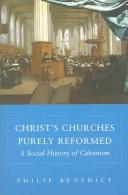
ISBN: 9786611740795 1281740799 0300127227 9780300127225 9780300105070 030010507X 9781281740793 0300088124 9780300088120 0300088124 9780300088120 Year: 2002 Publisher: New Haven, Conn. London Yale University Press
Abstract | Keywords | Export | Availability | Bookmark
 Loading...
Loading...Choose an application
- Reference Manager
- EndNote
- RefWorks (Direct export to RefWorks)
This sweeping and eminently readable book is the first synthetic history of Calvinism in almost fifty years. It tells the story of the Reformed tradition from its birth in the cities of Switzerland to the unraveling of orthodoxy amid the new intellectual currents of the seventeenth century. As befits a pan-European movement, Benedict's canvas stretches from the British Isles to Eastern Europe. The course and causes of Calvinism's remarkable expansion, the inner workings of the diverse national churches, and the theological debates that shaped Reformed doctrine all receive ample attention. The English Reformation is situated within the history of continental Protestantism in a way that reveals the international significance of English developments. A fresh examination of Calvinist worship, piety, and discipline permits an up-to-date assessment of the classic theories linking Calvinism to capitalism and democracy. Benedict not only paints a vivid picture of the greatest early spokesmen of the cause, Huldrych Zwingli and John Calvin, but also restores many lesser-known figures to their rightful place. Ambitious in conception, attentive to detail, this book offers a model of how to think about the history and significance of religious change across the long Reformation era.
Calvinism --- Social history. --- Descriptive sociology --- Social conditions --- Social history --- History --- Sociology --- Reformed Protestantism --- Congregationalism --- Reformation --- Reformed Church --- Theology, Doctrinal --- Arminianism --- Puritans --- Zwinglianism --- History. --- Doctrines --- Calvinism - Europe - History.
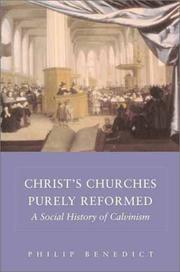
ISBN: 0300088124 030010507X 9780300088120 Year: 2002 Publisher: New Haven: Yale university press,
Abstract | Keywords | Export | Availability | Bookmark
 Loading...
Loading...Choose an application
- Reference Manager
- EndNote
- RefWorks (Direct export to RefWorks)
Christian church history --- Calvinism --- Calvinisme --- History. --- Histoire --- #GGSB: Protestantisme --- 284.2 --- Calvinistische hervorming. Zwinglianisme. Hervormden --- 284.2 Calvinistische hervorming. Zwinglianisme. Hervormden --- Calvinism -- Europe -- History. --- Electronic books. -- local. --- Social history. --- Religion --- Philosophy & Religion --- Christianity --- History --- Histoire. --- Protestantisme --- Calvinism - Europe - History. --- Christ --- Churches --- Reformation --- Zurich --- Wittenberg --- Zwingli --- Luther --- Bullinger --- Calvin --- Christian communities --- orthodoxy --- the Bible --- religious schisms --- Protestantism

ISBN: 0333691385 0333691393 9780333691397 9780333691380 Year: 2004 Volume: *16 Publisher: Basingstoke: Palgrave MacMillan,
Abstract | Keywords | Export | Availability | Bookmark
 Loading...
Loading...Choose an application
- Reference Manager
- EndNote
- RefWorks (Direct export to RefWorks)
History of Europe --- Christian church history --- anno 1600-1699 --- anno 1500-1599 --- Calvinism --- Reformed Church --- History --- Europe --- Church history --- -Reformed Church --- -Calvinism --- -284.2 --- Reformed Protestantism --- Congregationalism --- Reformation --- Theology, Doctrinal --- Arminianism --- Puritans --- Zwinglianism --- -History --- -Calvinistische hervorming. Zwinglianisme. Hervormden --- Doctrines --- Council of Europe countries --- Eastern Hemisphere --- Eurasia --- -Church history --- 284.2 Calvinistische hervorming. Zwinglianisme. Hervormden --- Calvinistische hervorming. Zwinglianisme. Hervormden --- 284.2 --- 16th century --- 17th century --- Calvinism - Europe - History - 16th century. --- Reformed Church - Europe - History - 16th century. --- Calvinism - Europe - History - 17th century. --- Reformed Church - Europe - History - 17th century. --- Europe - Church history - 16th century. --- Europe - Church history - 17th century.
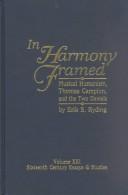
ISBN: 0940474220 9780940474222 Year: 1993 Volume: 22 Publisher: Kirksville (Mo.): Sixteenth century journal publ,
Abstract | Keywords | Export | Availability | Bookmark
 Loading...
Loading...Choose an application
- Reference Manager
- EndNote
- RefWorks (Direct export to RefWorks)
Calvinism --- Reformed Church --- History --- 284.2 --- Reformed Protestantism --- Congregationalism --- Reformation --- Theology, Doctrinal --- Arminianism --- Puritans --- Zwinglianism --- Calvinistische hervorming. Zwinglianisme. Hervormden --- Doctrines --- Courtly love in literature. --- English poetry --- Humanism in music. --- Humanists --- Music and literature --- Music --- Classical influences. --- History and criticism. --- 284.2 Calvinistische hervorming. Zwinglianisme. Hervormden --- History and criticism --- English poetry - Early modern, 1500-1700 - History and criticism. --- Music - England - 16th century - History and criticism. --- Music and literature - History - 16th century. --- Music and literature - History - 17th century. --- Calvinism - Europe - History - 16th century. --- Calvinism - Europe - History - 17th century. --- Reformed Church - Europe - History - 16th century. --- Reformed Church - Europe - History - 17th century.
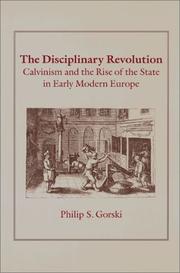
ISBN: 0226304841 0226304833 9780226304861 0226304868 9781283150750 1283150751 9780226304830 9780226304830 9780226304847 Year: 2003 Publisher: Chicago University of Chicago Press
Abstract | Keywords | Export | Availability | Bookmark
 Loading...
Loading...Choose an application
- Reference Manager
- EndNote
- RefWorks (Direct export to RefWorks)
What explains the rapid growth of state power in early modern Europe? While most scholars have pointed to the impact of military or capitalist revolutions, Philip S. Gorski argues instead for the importance of a disciplinary revolution unleashed by the Reformation. By refining and diffusing a variety of disciplinary techniques and strategies, such as communal surveillance, control through incarceration, and bureaucratic office-holding, Calvin and his followers created an infrastructure of religious governance and social control that served as a model for the rest of Europe-and the world.
Calvinism - Europe - History. --- Calvinism -- Europe -- History. --- Christian sociology -- Reformed Church -- History. --- Church and state - Europe - History. --- Church and state -- Europe -- History. --- Church and state -- Reformed Church -- History. --- Church and state - Reformed Church - History. --- Europe -- Church history. --- Europe - Politics and government. --- Europe -- Politics and government. --- Sociology, Christian (Reformed Church) - History. --- Christian sociology --- Church and state --- Calvinism --- Religion --- Philosophy & Religion --- Christianity --- Reformed Protestantism --- Congregationalism --- Reformation --- Reformed Church --- Theology, Doctrinal --- Arminianism --- Puritans --- Zwinglianism --- Christianity and state --- Separation of church and state --- State and church --- State, The --- Christian social theory --- Social theory, Christian --- Sociology, Christian --- Sociology --- History --- Doctrines --- History. --- Europe --- Politics and government --- Church history --- Reformed Church&delete& --- Church history. --- Politics and government. --- Politics
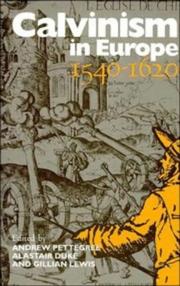
ISBN: 0521432693 9780521432696 Year: 1994 Publisher: Cambridge : Cambridge university press,
Abstract | Keywords | Export | Availability | Bookmark
 Loading...
Loading...Choose an application
- Reference Manager
- EndNote
- RefWorks (Direct export to RefWorks)
Calvinism --- History --- Congresses. --- Calvinisme --- Reformed churches --- -Reformed Protestantism --- -Calvinistische hervorming. Zwinglianisme. Hervormden--?"15" --- 284.2 "15" --- 284.2 "15" Calvinistische hervorming. Zwinglianisme. Hervormden--?"15" --- Calvinistische hervorming. Zwinglianisme. Hervormden--?"15" --- Reformed Protestantism --- Congregationalism --- Reformation --- Reformed Church --- Theology, Doctrinal --- Arminianism --- Puritans --- Zwinglianism --- History&delete& --- Congresses --- Doctrines --- Christian church history --- anno 1600-1699 --- anno 1500-1599 --- Europe --- Western Europe --- Histoire --- Congrès --- Calvinism - Europe - History - Congresses.
Book
ISBN: 9782600006873 2600006877 Year: 2009 Volume: 464 Publisher: Genève: Droz,
Abstract | Keywords | Export | Availability | Bookmark
 Loading...
Loading...Choose an application
- Reference Manager
- EndNote
- RefWorks (Direct export to RefWorks)
Dans les huit essais rassemblés ici, Heiko Oberman évalue un demi-siècle de recherche sur le Calvinisme. Il explore les prémices de la pensée de Calvin – lorsque celui-ci appelle les églises persécutées de France et les communautés d’exilés partout en Europe – et par ce retour aux sources de la Réforme, Heiko Oberman cherche à identifier en quoi le Calvinisme a été le mouvement le plus rallié du Christianisme Protestant vers la fin du seizième siècle. Incisif dans ses arguments et perspicace dans son point de vue, les découvertes d’Oberman ont grandement contribué à la forme actuelle de la recherche sur Calvin et sur le Calvinisme.
Reformation. --- Calvinism --- Reformation --- Protestant Reformation --- Church history --- Counter-Reformation --- Protestantism --- Reformed Protestantism --- Congregationalism --- Reformed Church --- Theology, Doctrinal --- Arminianism --- Puritans --- Zwinglianism --- History --- Doctrines --- Calvin, Jean, --- Calvijn, Johannes --- Calvin, Jean --- Calvinus, Johannes --- Calvin, John --- Calvinism - Europe - History - 16th century --- Calvin, Jean, - 1509-1564 --- Calvin, Jean (1509-1564) --- Réforme --- Réfugiés religieux --- Huguenots --- Critique et interprétation --- Influence
Book
ISBN: 9782803103782 2803103788 Year: 2013 Volume: 27 Publisher: Bruxelles: Académie royale de Belgique,
Abstract | Keywords | Export | Availability | Bookmark
 Loading...
Loading...Choose an application
- Reference Manager
- EndNote
- RefWorks (Direct export to RefWorks)
La crise des années 2007-2013 constitue une immersion brutale dans le capitalisme anglo-saxon. Nos communautés latines traversent un profond changement de modèle touchant à la trame de leurs valeurs collectives. Il n'est pas impossible que nos communautés latines, pourtant sécularisées, subissent aujourd'hui de lointains effets collatéraux de la Réforme qui les avait épargnées au XVIe siècle.
Economic structure --- Europe --- Capitalism --- Capitalisme --- Calvinism --- History --- Calvin, Jean, --- AA / International- internationaal --- 330.40 --- 330.52 --- 201 --- 174 --- 322 --- Geschiedenis van het economisch en sociaal denken --- Evolution historique de la pensée économique et sociale: généralités --- History of the economic and social thinking --- 330.40 Geschiedenis van het economisch en sociaal denken --- 330.40 Evolution historique de la pensée économique et sociale: généralités --- 330.40 History of the economic and social thinking --- Geschiedenis van het economisch en sociaal denken. --- Liberaal systeem. Neo-liberalisme. Theorie van de onderhandeling. --- Sociologie: algemeenheden. --- Verband tussen de ethiek en de economie. Ethiek en bedrijf. --- de Staat en de kerk. Godsdienstbeleid. Sociale rol van de kerken. --- Religious aspects --- Economic aspects --- Economic history --- Liberaal systeem. Neo-liberalisme. Theorie van de onderhandeling --- Sociologie: algemeenheden --- Verband tussen de ethiek en de economie. Ethiek en bedrijf --- de Staat en de kerk. Godsdienstbeleid. Sociale rol van de kerken --- Capitalism - Europe --- Calvinism - Europe - History --- Calvin, Jean, - 1509-1564 --- Calvin, Jean, 1509-1564
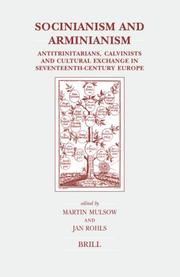
ISSN: 09208607 ISBN: 9004147152 9789004147157 9047416090 9789047416098 Year: 2005 Volume: v. 134 Publisher: Leiden: Brill,
Abstract | Keywords | Export | Availability | Bookmark
 Loading...
Loading...Choose an application
- Reference Manager
- EndNote
- RefWorks (Direct export to RefWorks)
Socinianism has often been studied in national contexts and apart from other currents like Arminianism. This volume is especially interested in the “in-betweens”: the relationship of Anti-trinitarianism to “liberal” currents in reformed Protestantism, namely Dutch Remonstrants, English Latitudinarians and some French Huguenots. This in-between also has a local aspect: the volume studies the transformations that Anti-trinitarianism experienced in the complicated transition from its origins in Italy and its refuge in Poland, Moravia and Transsylvania to Prussia, to the Netherlands and later to England. What effects did this transfer have on the dynamics of pluralization in the progressive Netherlands? How did the Socinians overcome social adaptation from a group of exiles to a diffuse movement of modernization? How did they manage to connect within the new milieu of Arminians, Cartesians, Spinozists and Lockeans? Contributors include: Hans W. Blom, Roberto Bordoli, Douglas Hedley, Sarah Hutton, Didier Kahn, Dietrich Klein, Florian Mühlegger, Martin Mulsow, Jan Rohls, Luisa Simonutti, and Stephen David Snobelen.
History of civilization --- Christian church history --- History of Europe --- anno 1600-1699 --- Theology, Doctrinal --- Socinianism --- Arminianism --- Calvinism --- Théologie dogmatique --- Socinianisme --- Arminianisme --- Calvinisme --- History --- History of doctrines --- Histoire --- Histoire des doctrines --- Europe --- Church history --- Intellectual life --- Histoire religieuse --- Vie intellectuelle --- -Socinianism --- -Arminianism --- -Calvinism --- -Intellectual life --- -284.91 --- 288 --- Cultural life --- Culture --- Reformed Protestantism --- Congregationalism --- Reformation --- Reformed Church --- Puritans --- Zwinglianism --- Protestantism --- Antitrinitarianism --- Arianism --- Trinity --- Unitarianism --- Christian doctrines --- Christianity --- Doctrinal theology --- Doctrines, Christian --- Dogmatic theology --- Fundamental theology --- Systematic theology --- Theology, Dogmatic --- Theology, Systematic --- Theology --- -History of doctrines --- -Arminianisme. Remonstranten. Synode van Dordrecht--(1618-1619) --- Antitrinitariërs. Unitariërs. Heshusianen. Socinianen. Racovianische catechismus --- Doctrines --- Council of Europe countries --- Eastern Hemisphere --- Eurasia --- -Conferences - Meetings --- 284.91 Arminianisme. Remonstranten. Synode van Dordrecht--(1618-1619) --- Arminianisme. Remonstranten. Synode van Dordrecht--(1618-1619) --- Théologie dogmatique --- 284.91 --- Conferences - Meetings --- Theology [Doctrinal ] --- 17th century --- Theology, Doctrinal - Europe - History - 17th century. --- Socinianism - Europe - History of doctrines - 17th century. --- Arminianism - Europe - History of doctrines - 17th century. --- Calvinism - Europe - History of doctrines - 17th century. --- Intellectual life - 17th century. --- Europe - Church history - 17th century. --- GROTIUS (HUGO DE GROOT, DIT), JURISTE ET DIPLOMATE HOLLANDAIS, 1583-1645 --- THEOLOGIE DOGMATIQUE --- SOCINIANISME --- ARMINIANISME --- CALVINISME --- VIE INTELLECTUELLE --- CRITIQUE ET INTERPRETATION --- EUROPE --- 17E SIECLE --- HISTOIRE DES DOCTRINES
| Listing 1 - 10 of 10 |
Sort by
|

 Search
Search Feedback
Feedback About UniCat
About UniCat  Help
Help News
News